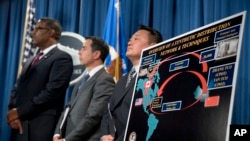U.S. law enforcement officials announced Tuesday the indictments of two Chinese nationals and their North American associates charged with manufacturing and distributing fentanyl and other opioids in the United States, highlighting China's role as a global supplier of illicit opiate substances.
U.S. Deputy Attorney General Rod Rosenstein said the charges against Xiaobing Yan, 40, and Jian Zhang, 38, represent the first-ever indictments brought against designated Chinese manufacturers of fentanyl and other opiate substances.
The indictments come amid a brewing scandal in the United States over the role President Donald Trump's nominee to head the Drug Enforcement Agency played in passing legislation that undercut the agency's ability to target manufacturers of opioids. Trump announced on Tuesday that the nominee, Tom Marino, a member of Congress, had withdrawn his name from consideration.
Rosenstein said he was "very concerned" by the revelation, first reported by CBS's 60 Minutes and The Washington Post, but he said "if you look at the data, what you see is that the increase in drug overdose deaths is actually driven by the Chinese fentanyl rather than the pharmaceutical drugs."
"The pharmaceutical drugs are a problem as well, but I think we have to keep it in perspective as well," Rosenstein said. "We have a number of challenges that we need to deal with, all of which fall under the rubric of the opioid overdose crisis."
The opioid overdose crisis is being fueled in large part by the growing prevalence of fentanyl imported from China and other countries. Since 2000, the epidemic has killed over half a million Americans, according to the Centers for Disease Control and Prevention. Last year, more than 64,000 Americans died of drug overdoses, including more than 20,000 who overdosed on fentanyl, preliminary CDC data show.
Fentanyl, a painkiller that is 100 times stronger than morphine, is available as a Schedule II prescription drug in the United States. While toxicology tests don't distinguish between prescription and illegal fentanyl, drug seizure data suggest "a substantial portion of the increase in synthetic opioid deaths appears to be related to increased availability of illicit fentanyl," according to a 2016 CDC report.
China is the main source of illicit fentanyl sold in the United States, according to a recent report by the U.S.-China Economic and Security Review Commission. In addition to shipping directly to U.S. customers, Chinese manufacturers, which are weakly regulated, deliver shipments of the drug to Mexico and Canada from which it is trafficked into the United States, the report said.
'Ton quantities'
Yan and Zhang operated labs and chemical plants in China that were capable of producing "ton quantities" of fentanyl and fentanyl analogues, Rosenstein said.
"Yan monitored legislation and law enforcement activities in the United States and China, modifying the chemical structure of the fentanyl analogues he produced to evade prosecution in the United States," Rosenstein said.
Zhang allegedly ran an organization that manufactured fentanyl in at least four labs in China and advertised and sold the drug to U.S. customers over the internet.
"Zhang's organization would send orders of fentanyl and other illicit drugs, and pill presses, stamps, and dies used to shape fentanyl into pills, to customers in the United States through the mail or international parcel delivery services," Rosenstein said.
Rosenstein would not say whether Chinese authorities have arrested the two suspects or shut down their labs and websites. However, while touting Chinese cooperation with the investigation, he said the U.S. wants China to do more to stem the flow of illegal drugs into the country.
"We need them to do more because 20,000 American citizens lost their lives in 2016 and tens of thousands more were injured as a result of fentanyl manufactured in China, distributed from China to the United States," he said.
Joseph S. Campbell, a director at Navigant Consulting in Washington, said that "there are issues with corruption [in China] that I'm sure add to the ability of individuals to develop different types of opioids."
Taking down the two Chinese drug rings could have a ripple effect, he said.
"The more action is taken in regard to identifying and disrupting these groups, the more information is obtained," said Campbell, a former assistant FBI director. "It helps the authorities to identify and target other groups."











